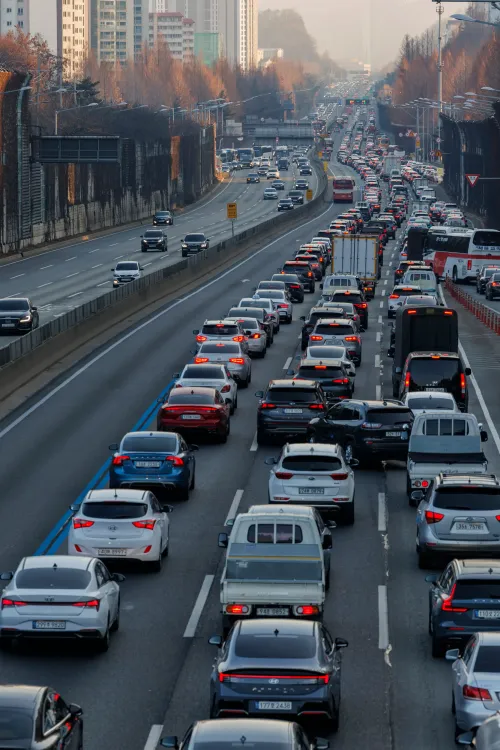South Korea: Highway Traffic Surges on First Day of Extended Lunar New Year Celebration

Synopsis
Key Takeaways
- 5.05 million vehicles expected on the roads.
- Extended Lunar New Year holiday until January 30.
- Traffic peaked from 11 AM to 12 PM.
- Journey times from Seoul to Busan around 5 hours and 10 minutes.
- Financial markets closed for holiday.
Seoul, Jan 25 (NationPress) Traffic on significant highways has been steadily increasing throughout South Korea on Saturday, signaling the commencement of the Lunar New Year, as individuals make their way back to their hometowns for one of the nation’s principal traditional celebrations.
This year, the Lunar New Year holiday, referred to as Seol, has been expanded to six days, running until Thursday, following the government's declaration of Monday as a temporary national holiday.
As of 5 PM, a journey from Seoul to the southeastern port city of Busan, which is 320 kilometers away, was anticipated to take roughly five hours and 10 minutes, according to the state-run Korea Expressway Corporation, as reported by Yonhap news agency.
A trip heading east to Gangneung, located about 160 kilometers from Seoul, was projected to take three hours.
Traffic congestion on outbound routes from Seoul peaked between 11 AM and 12 PM, with expectations of relief around 7 PM to 8 PM, according to the agency.
Conversely, travel durations towards Seoul were significantly shorter, with the drive from Busan expected to take four hours and 30 minutes, and the trip from Gangneung estimated at two hours and 40 minutes.
The agency predicted that approximately 5.05 million vehicles would be on the roads nationwide on Saturday, including 460,000 cars departing from the greater Seoul area and 360,000 heading towards it.
Despite the surge, traffic on major highways was relatively smooth in both directions, and the traditional exodus was somewhat alleviated this year due to the extended holiday span.
The South Korean stock and foreign exchange markets will also be closed on January 27 for a temporary holiday, as confirmed by their operators on Friday.
Financial markets, including the main Korea Composite Stock Price Index and the tech-heavy KOSDAQ, as well as the ETF, derivatives, and commodity markets, will remain closed from that day through January 30 for an extended six-day holiday, according to market operators.
Seol, or Lunar New Year's Day, is one of the most cherished traditional holidays in the country. Many South Koreans travel to their hometowns during this period to engage in ancestral ceremonies and spend quality time with their families.










